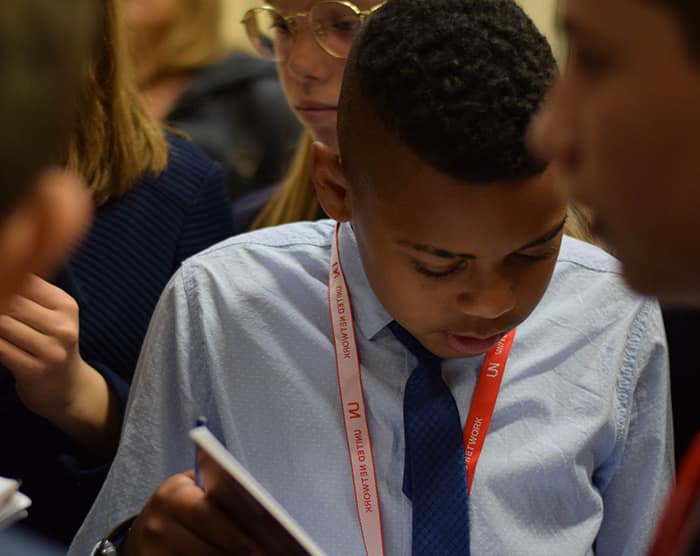SNAP Iunior
SNAP Iunior è l’occasione perfetta per scoprire quanto può essere divertente far finta di essere un deputato del Parlamento italiano. Insieme ai tuoi compagni ed altri giovanissimi studenti come te, provenienti da altre scuole, lavorerai all’interno di un Gruppo Parlamentare simulato, mettendo in pratica tutto quello che normalmente succede all’interno della Camera dei deputati: terrai discorsi, approverai leggli ed emendamenti. E a rendere tutto più divertente ci saranno le crisi, che dovrai affrontare e gestire con competenza e sangue freddo, adottando misure urgenti per risolvere l’emergenza. SNAP Iunior si svolge in lingua italiana ed è destinato agli studenti delle scuole medie.

Come si svolge
SNAP IUNIOR?
Lo staff di United Network, composto da studenti universitari con anni di esperienza nella conduzione di simulazioni, ti aiuterà e ti incoraggerà, passo dopo passo, a lavorare, in qualità di Deputato, all’interno del tuo gruppo parlamentare. Fin dal primo giorno comincerete a metter mano alla Vostra proposta di Legge, alternando momenti di dibattito formale a momenti di confronto e collaborazione o – perchè no – anche “scontro”, tra i vari gruppi. Alla fine dei tre giorni di lavori, voterai le proposte di legge che avrete elaborato durante la simulazione. Il percorso si concluderà con una cerimonia conclusiva in cui verranno anche assegnate le menzioni d’onore per coloro che hanno saputo interpretare al meglio il loro ruolo. Ma, non dimenticare, sarai pur sempre un Deputato, perciò ricordati il formal dress: giacca e cravatta per i ragazzi e tailleur per le ragazze.
La preparazione
La simulazione sarà preceduta da un corso di formazione che ti consentirà di vivere i giorni di simulazione con tranquillità, consapevolezza e anche divertendoti. Il corso di formazione avrà una durata complessiva di 6 ore. Lo Staff di United Network ti aiuterà anche durante la formazione, se avrai dubbi, domande o semplici curiosità su come funziona la simulazione. Saranno sempre accanto a te, pronti a darti una mano.
SNAP - FAQ
Le risposte che cerchi
Possono prendere parte a SNAP IUNIOR tutti gli studenti iscritti alle scuole medie italiane.
È possibile iscriversi facendo click su questo link. Le istruzioni per completare l’iscrizione saranno inviate all’e-mail di contatto dello studente successivamente alla registrazione. L’iscrizione sarà considerata valida solo dopo il saldo della quota di partecipazione. La partecipazione degli studenti alla simulazione è a numero programmato. Gli studenti che non completeranno l’iscrizione nei tempi richiesti saranno collocati in lista d’attesa.
I costi di partecipazione a SNAP IUNIOR sono indicati nel materiale informativo distribuito presso le scuole. È possibile richiedere maggiori informazioni inviando una e-mail a info@unitednetwork.it o chiamando la nostra sede. La quota di partecipazione include: partecipazione al Delegate Training Course; partecipazione a SNAP IUNIOR; materiale didattico; attestato di partecipazione e frequenza.
Ogni anno United Network mette a disposizione più di 100.000 euro in borse di studio a sostegno dei redditi più bassi. Per richiedere una borsa di studio iscriviti al progetto e segui le istruzioni riportate nella tua area riservata. È possibile subordinare l’adesione definitiva all’assegnazione di una borsa di studio.
Il progetto SNAP IUNIOR si svolge in lingua italiana.
SNAP - FAQ
Possono prendere parte a SNAP IUNIOR tutti gli studenti iscritti alle scuole medie italiane.
È possibile iscriversi facendo click su questo link. Le istruzioni per completare l’iscrizione saranno inviate all’e-mail di contatto dello studente successivamente alla registrazione. L’iscrizione sarà considerata valida solo dopo il saldo della quota di partecipazione. La partecipazione degli studenti alla simulazione è a numero programmato. Gli studenti che non completeranno l’iscrizione nei tempi richiesti saranno collocati in lista d’attesa.
I costi di partecipazione a SNAP IUNIOR sono indicati nel materiale informativo distribuito presso le scuole.
È possibile richiedere maggiori informazioni inviando una e-mail a info@unitednetwork.it o chiamando la nostra sede. La quota di partecipazione include: partecipazione al Delegate Training Course; partecipazione a SNAP IUNIOR; materiale didattico; attestato di partecipazione e frequenza.
Ogni anno United Network mette a disposizione più di 100.000 euro in borse di studio a sostegno dei redditi più bassi. Per richiedere una borsa di studio iscriviti al progetto e segui le istruzioni riportate nella tua area riservata. È possibile subordinare l’adesione definitiva all’assegnazione di una borsa di studio.
Il progetto SNAP IUNIOR si svolge in lingua italiana.